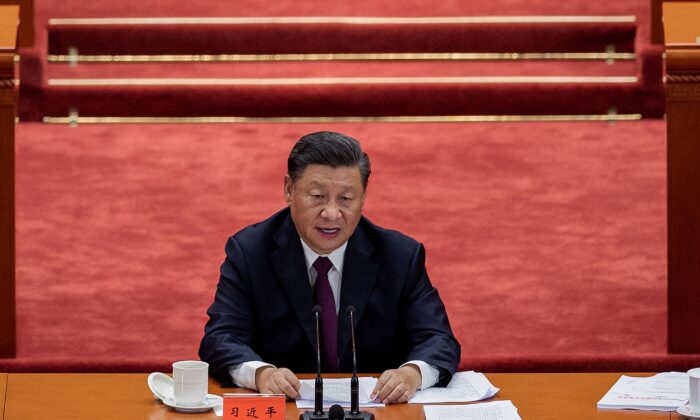Behold the Beauty: Pregnant Dreaming, ‘Dreams 2‘ by Rubén Belloso
Chinese leader Xi Jinping delivered a lengthy, high-profile address at the Great Hall of the People in Beijing to mark the 70th anniversary of the Korean War.
The Chinese regime refers to it as the “War to Resist U.S. Aggression and Aid Korea.”
Xi’s speech came after China’s state broadcaster CCTV finished airing a 20-episode documentary series on the conflict.
 Major Cleveland of the 2nd Inf. Division points out Communist-led North Korean position to his machine gun crew on Nov. 20, 1950, during the Korean War. (U.S. National Archives and Records Administration)
Major Cleveland of the 2nd Inf. Division points out Communist-led North Korean position to his machine gun crew on Nov. 20, 1950, during the Korean War. (U.S. National Archives and Records Administration)Xi began his speech on Oct. 23 by repeating the Chinese Communist Party’s propaganda that the United States first invaded North Korea, and Chinese troops sacrificed themselves to resist U.S. aggression.
In fact, the conflict ignited when Pyongyang forces suddenly attacked South Korea in June 1950. Weeks later, the United Nations joined the war on the side of South Korea, with soldiers from 21 countries.
After branding the UN troops as “invaders,” he said the Chinese army “shattered the myth of the U.S. army’s invincibility” and eventually gained a “great victory” with North Korea.
The Chinese leader then proclaimed that the Chinese regime would be willing to “end a war with a war; and end force with force when dealing with invaders.”
In this nationalistic address, Xi said the Chinese people are now organized and aren’t to be trifled with. “Once provoked, things will get ugly,” he said.
Xi also made indirect swipes at the United States, saying that some countries “pursue unilateralism, protectionism, and extreme egotism that leads nowhere.” Chinese state media and officials have previously used such phrases to describe the United States when trade war tensions were at their zenith.
Xi vowed that China will never allow its “national sovereignty, security, and development interests to be undermined,” and that “the Chinese people will deliver a head-on blow” if such incidents occur.
Zhu Lei, a scholar from Zhejiang Province, told Radio Free Asia that Xi’s remarks signaled that Beijing would escalate tensions with the United States.
China commentator Yang Wei told The Epoch Times on Oct. 22 that Xi’s speech demonstrates that he wants to promote patriotism in order to guarantee the CCP’s rule—especially his personal authority within the Party.
Wu Qiang, former lecturer of political science at Beijing’s Tsinghua University, expressed that this is the toughest rhetoric by Chinese leaders in the past four decades, in an interview with RFA.
Xi’s speech preceded the opening of the CCP’s fifth plenary session, a key political meeting when senior officials discuss future economic policies and goals. Some China observers said Xi was seeking to assert his dominance in the Party ahead of the plenum.
Focus News: Xi Stirs up Nationalistic, Anti-Us Sentiment During Korean War Anniversary Speech
Cooking With Love, Paprika, and MusicalsCooking for the StarsThrill of a Good MealMusic and a Meal
